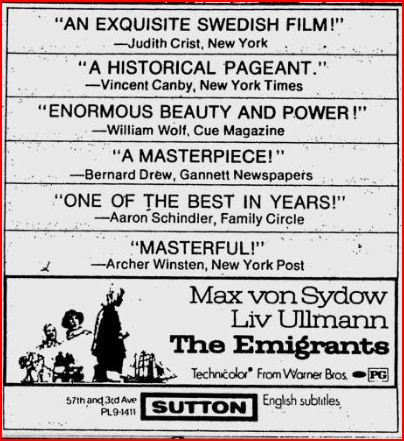
The early acts, set in some rural backwater, are reminiscent of the more sordid revisionist westerns made by Americans. Equally far from the Swinging Sweden of the X-rated imagination or the austere Symbolist landscape of Ingmar Bergman, the Sweden of Utvandrarna is a filthy place from which anyone in his right mind would want to escape. Farmer Karl-Oskar (Von Sydow) can't support his wife Kristina (Ullmann) and their growing brood of kids -- they argue frequently over who's to blame for the expansion -- on his rocky soil. The couple ends up leading a little band of losers and outcasts -- two brothers, one of whom is cruelly accused of making love to his heifer, as well as dissident members of a local church congregation -- across the Atlantic in a wretched, life-threatening passage. In America, they struggle to make their way to the open, fertile country, depending on one man reading phrasebook sentences to strangers in the hope of getting directions. It's here that the absurdity of an English dub becomes apparent. In this format, we get the emigrants asking their English expert, in English, to ask for directions; he asks and is answered, and the emigrants ask, in English, what the American, in English, had said. That aside, I can see why Warners went for it, especially since Von Sydow and Ullmann were by then fluent in English, though it also means that the dubbed film suffers a little from the sense that the words are spoken in a vacuum, while the obvious presence of omnipresent voiceover actor Paul Frees among the voice artists undercuts the naturalist authenticity Troell was aiming for.
Around the world, it seems, the Seventies were a golden age of cinematic naturalism, providing aesthetic justification for the pervasive mud and dysfunctional personalities of revisionist westerns and genre revisionism in general. Audiences seemed to want to see the world and its people warts and all, scrubbed clean (ironically speaking) of the romanticism of generations of genre. Before the decade was out, the rigors of such films as Utvandrarna left audiences ready for romance again, but if the squalor of Sweden wasn't alienating enough, Troell filmed the story in an anecdotal rather than dramatic narrative manner, without character arcs or film-length conflicts or courtships to tighten its focus. Perhaps appropriately, that narrative style may have made the film authentically foreign for Americans, whether they saw it subtitled or dubbed. In any event, audiences were more adventurous then, or so we think when idealizing the Seventies, and Troell's grim chronicle is convincing and compelling enough to make me eager to see The New Land, the sequel, at some point. More immediate on my agenda, however, is a TCM showing later this month of Zandy's Bride, which should make for interesting comparisons if nothing else. Watch for a DVR Diary review, coming soon to this blog.
1 comment:
Great work here Samuel! Well, I've promoted this film for decades offering up unwavering support. I am still in disbelief it has yet to receive a legitimate DVD or blu ray release, and actually still own this film and its companion piece THE NEW LAND on laserdisc! Yes excellent point there about the 70's offering up cinematic naturalism -of which this film of course is a supreme example- and I also see the revisionism, and naturally the kinship with Ingmar Bergman. Last week I watched Troell's very first film on Criterion blu ray and was impressed. Will be looking to read your piece on THE NEW LAND! In any case Von Sydow and Ullmann were extraordinary in both films, though no surprise.
Post a Comment